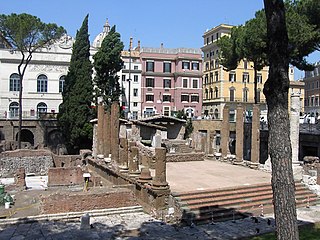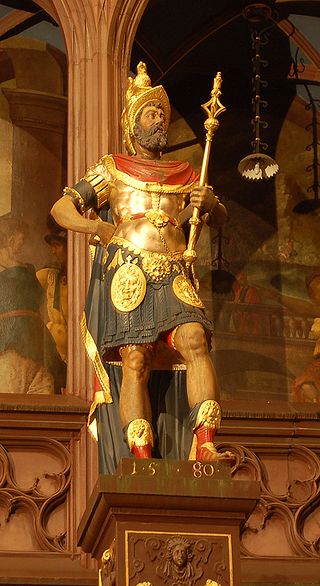
Marcus Porcius Cato, also known as Cato the Censor, the Elder and the Wise, was a Roman soldier, senator, and historian known for his conservatism and opposition to Hellenization. He was the first to write history in Latin with his Origines, a now fragmentary work on the history of Rome. His work De agri cultura, a rambling work on agriculture, farming, rituals, and recipes, is the oldest extant prose written in the Latin language. His epithet "Elder" distinguishes him from his great-grandson Cato the Younger, who opposed Julius Caesar.

The gens Livia was an illustrious plebeian family at ancient Rome. The first of the Livii to obtain the consulship was Marcus Livius Denter in 302 BC, and from his time the Livii supplied the Republic with eight consuls, two censors, a dictator, and a master of the horse. Members of the gens were honoured with three triumphs. In the reign of Augustus, Livia Drusilla was Roman empress, and her son was the emperor Tiberius.

The gens Valeria was a patrician family at ancient Rome, prominent from the very beginning of the Republic to the latest period of the Empire. Publius Valerius Poplicola was one of the consuls in 509 BC, the year that saw the overthrow of the Tarquins, and the members of his family were among the most celebrated statesmen and generals at the beginning of the Republic. Over the next ten centuries, few gentes produced as many distinguished men, and at every period the name of Valerius was constantly to be found in the lists of annual magistrates, and held in the highest honour. Several of the emperors claimed descent from the Valerii, whose name they bore as part of their official nomenclature.
The gens Tullia was a family at ancient Rome, with both patrician and plebeian branches. The first of this gens to obtain the consulship was Manius Tullius Longus in 500 BC, but the most illustrious of the family was Marcus Tullius Cicero, the statesman, orator, and scholar of the first century BC. The earliest of the Tullii who appear in history were patrician, but all of the Tullii mentioned in later times were plebeian, and some of them were descended from freedmen. The English form Tully, often found in older works, especially in reference to Cicero, is now considered antiquated.

The gens Licinia was a celebrated plebeian family at ancient Rome, which appears from the earliest days of the Republic until imperial times, and which eventually obtained the imperial dignity. The first of the gens to obtain the consulship was Gaius Licinius Calvus Stolo, who, as tribune of the plebs from 376 to 367 BC, prevented the election of any of the annual magistrates, until the patricians acquiesced to the passage of the lex Licinia Sextia, or Licinian Rogations. This law, named for Licinius and his colleague, Lucius Sextius, opened the consulship for the first time to the plebeians. Licinius himself was subsequently elected consul in 364 and 361 BC, and from this time, the Licinii became one of the most illustrious gentes in the Republic.

The gens Pompeia was a plebeian family at ancient Rome, first appearing in history during the second century BC, and frequently occupying the highest offices of the Roman state from then until imperial times. The first of the Pompeii to obtain the consulship was Quintus Pompeius in 141 BC, but by far the most illustrious of the gens was Gnaeus Pompeius, surnamed Magnus, a distinguished general under the dictator Sulla, who became a member of the First Triumvirate, together with Caesar and Crassus. After the death of Crassus, the rivalry between Caesar and Pompeius led to the Civil War, one of the defining events of the final years of the Roman Republic.

The gens Calpurnia was a plebeian family at ancient Rome, which first appears in history during the third century BC. The first of the gens to obtain the consulship was Gaius Calpurnius Piso in 180 BC, but from this time their consulships were very frequent, and the family of the Pisones became one of the most illustrious in the Roman state. Two important pieces of Republican legislation, the lex Calpurnia of 149 BC and lex Acilia Calpurnia of 67 BC were passed by members of the gens.

The gens Marcia, occasionally written Martia, was one of the oldest and noblest houses at ancient Rome. They claimed descent from the second and fourth Roman Kings, and the first of the Marcii appearing in the history of the Republic would seem to have been patrician; but all of the families of the Marcii known in the later Republic were plebeian. The first to obtain the consulship was Gaius Marcius Rutilus in 357 BC, only a few years after the passage of the lex Licinia Sextia opened this office to the plebeians.
The gens Popillia, sometimes written Popilia, was a plebeian family in Rome. The first of the Popillii to obtain the consulship was Marcus Popillius Laenas in 359 BC, only eight years after the lex Licinia Sextia opened that magistracy to the plebeians.
Marcus Porcius Cato Licinianus was son of Cato the Censor by his first wife Licinia, and thence called Licinianus, to distinguish him from his half-brother, Marcus Porcius Cato Salonianus, the son of Salonia. He was distinguished as a jurist.
Marcus Porcius M. f. M. n. Cato Salonianus was the younger son of Cato the Elder, and grandfather of Marcus Porcius Cato Uticensis, also known as "Cato the Younger".

The gens Lutatia, occasionally written Luctatia, was a plebeian family of ancient Rome. The first of the gens to obtain the consulship was Gaius Lutatius Catulus in 242 BC, the final year of the First Punic War. Orosius mentions their burial place, the sepulchrum Lutatiorum, which lay beyond the Tiber.
The gens Terentia was a plebeian family at ancient Rome. Dionysius mentions a Gaius Terentius Arsa, tribune of the plebs in 462 BC, but Livy calls him Terentilius, and from inscriptions this would seem to be a separate gens. No other Terentii appear in history until the time of the Second Punic War. Gaius Terentius Varro, one of the Roman commanders at the Battle of Cannae in 216 BC, was the first to hold the consulship. Members of this family are found as late as the third century AD.

The gens Mucia was an ancient and noble patrician house at ancient Rome. The gens is first mentioned at the earliest period of the Republic, but in later times the family was known primarily by its plebeian branches.

The gens Postumia was a noble patrician family at ancient Rome. Throughout the history of the Republic, the Postumii frequently occupied the chief magistracies of the Roman state, beginning with Publius Postumius Tubertus, consul in 505 BC, the fifth year of the Republic. Although like much of the old Roman aristocracy, the Postumii faded for a time into obscurity under the Empire, individuals bearing the name of Postumius again filled a number of important offices from the second century AD to the end of the Western Empire.
The gens Manilia was a plebeian family at ancient Rome. Members of this gens are frequently confused with the Manlii, Mallii, and Mamilii. Several of the Manilii were distinguished in the service of the Republic, with Manius Manilius obtaining the consulship in 149 BC; but the family itself remained small and relatively unimportant.
The gens Mummia was a plebeian family at Rome. Members of this gens are first mentioned after the Second Punic War, and within a generation, Lucius Mummius Achaicus became the first of the family to obtain the consulship. Although they were never numerous, Mummii continued to fill the highest offices of the state through the third century AD.

The gens Munatia was a plebeian family at Rome. Members of this gens are first mentioned during the second century BC, but they did not obtain any of the higher offices of the Roman state until imperial times.
Marcus Porcius M. f. M. n. Cato was the father of Cato the Younger. His promising political career was cut short by his sudden death, early in the first century BC.
Livia Drusa was a Roman matron. She was the daughter of Marcus Livius Drusus, consul in 112 BC, and sister of Marcus Livius Drusus, tribune of the plebs in 91 BC. She was the mother of Cato the Younger, and grandmother of Marcus Junius Brutus, through her oldest daughter Servilia.












